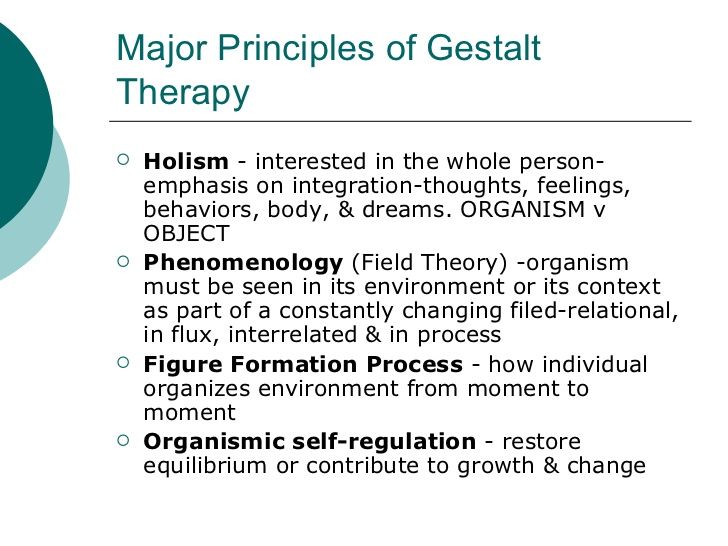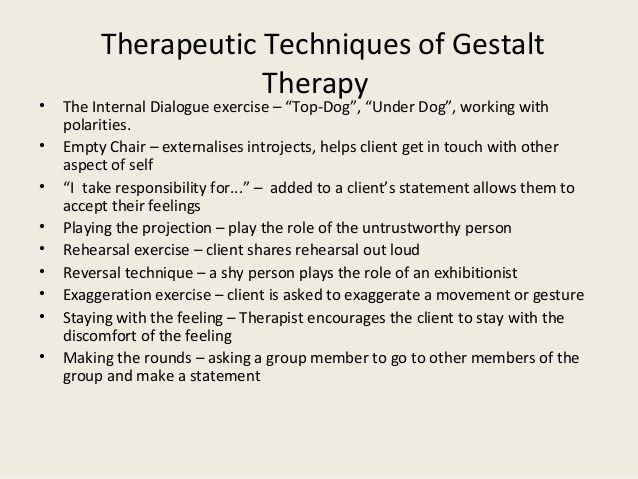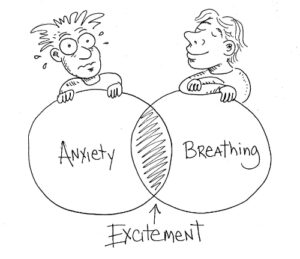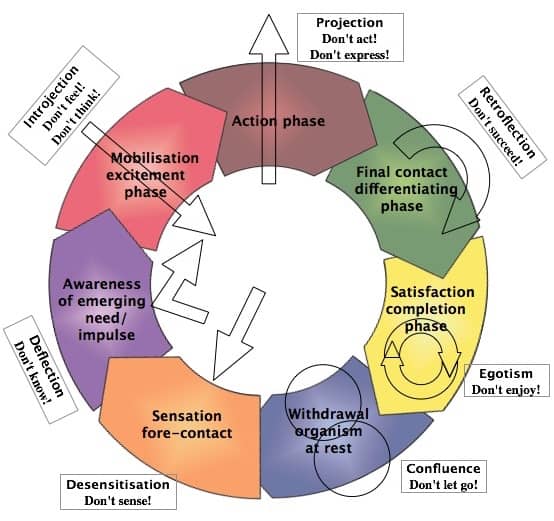Gestalt therapy is a form of psychotherapy that helps people become more aware of their thoughts and feelings. It was developed in the 1940s and has been growing in popularity ever since. Gestalt therapy can help people who are struggling with a variety of issues, including anxiety, depression, addiction, and trauma. In this article, we will explore who can benefit from Gestalt therapy, how it works, and why you might consider giving it a try.
Contents
Understanding Gestalt Therapy

Gestalt therapy is a type of psychotherapy that emphasizes awareness and personal growth. It was developed in the 1940s by Fritz Perls, Laura Perls, and Paul Goodman. Gestalt therapy is sometimes also called insight-oriented therapy or humanistic psychology.
Theory Behind Gestalt Therapy
Gestalt therapy is based on the belief that we are all connected to the world around us. This means that our thoughts, feelings, and actions are all interrelated.
When we become aware of our thoughts and feelings, we can start to understand how they impact our behavior. We can also begin to see how our behavior affects those around us.
Gestalt Cycle of Change
The Gestalt Cycle of Change is a model of how change happens. It starts with awareness, followed by learning, doing, and finally, integration.
- Awareness: The first step is to become aware of your thoughts and feelings. This can be done through self-reflection or by talking to a therapist.
- Learning: The next step is to learn about how your thoughts and feelings impact your behavior. This can be done through reading, therapy, or research.
- Doing: The next step is to start making changes in your life. This might involve making lifestyle changes, trying new things, or learning new skills.
- Integration: The final step is to integrate the changes you have made into your life. This might involve making permanent changes, or it might just mean accepting yourself for who you are.
History And Development
Gestalt therapy was developed by Fritz Perls, Laura Perls, and Paul Goodman in the 1940s. It was originally designed as a form of group therapy but has since been adapted for use with individuals as well. This therapy has been growing in popularity ever since and is now used by therapists all over the world.
Unfolding Gestalt Therapy

Who Can It Help
Gestalt therapy is an effective treatment for a variety of mental health issues.
- It is particularly helpful for treating anxiety, depression, addiction, and trauma.
- This therapy can also help people who are struggling with relationship issues, low self-esteem, and feelings of isolation.
How Does It Work

Gestalt therapy helps people become more aware of their thoughts and feelings. It also helps them understand how their thoughts and feelings impact their behavior. In addition, this therapy helps people understand how their behavior affects those around them.
Techniques Used In Gestalt Therapy

This therapy uses a variety of techniques to help people become more aware of their thoughts and feelings. These techniques include:
- Focusing on the present moment: This helps people become more aware of their thoughts and feelings in the here and now.
- Experiencing emotions fully: This helps people understand and accept their emotions.
- Using body awareness: This helps people connect with their bodies and become more aware of their physical sensations.
- Working with dreams: This helps people understand the symbolism in their dreams and how it relates to their waking life.
Evaluating Gestalt Therapy

This therapy is generally considered to be a safe and effective treatment for mental health issues. However, as with any type of therapy, it has its share of risks. These risks include:
- Feeling worse before feeling better
- Discomfort from talking about difficult topics
- Feeling exposed or vulnerable during therapy
It is important to talk to your therapist about any concerns you have before starting Gestalt therapy.
Benefits of Gestalt Therapy
There are many benefits of this therapy. These benefits include:
- improved mental health
- increased self-awareness
- improved relationships with others
- greater insight into your thoughts and feelings
- improved ability to manage stress and cope with difficult emotions
Common Concerns And Limitations
As with any type of therapy, there are some concerns and limitations associated with this therapy. These include:
- it may not be covered by insurance
- it takes time and effort to see results
- the lack of scientific research on Gestalt therapy
- the need for a trained and experienced therapist
- may not be right for everyone. Some people may find it too challenging or uncomfortable
Why Consider It
If you are struggling with a mental health issue, this therapy may be a good option for you. It is an effective treatment for a variety of mental health issues. And can help you become more aware of your thoughts and feelings. However, you should also make sure to ask about the risks and benefits before starting treatment.
Finding a Gestalt Therapist
 Here are some tips for finding a Gestalt therapist:
Here are some tips for finding a Gestalt therapist:
- Ask your doctor or mental health professional for a referral.
- Call a local mental health clinic or hospital and ask for a referral.
- Search online directories, such as the American Psychological Association’s Therapist Finder.
- Ask family and friends if they know of a therapist who specializes in Gestalt therapy.
What To Look Out For
When searching for a Gestalt therapist, there are a few things you should keep in mind.
- First, make sure the therapist is licensed and has experience working with people with mental health issues.
- Second, make sure the therapist is a good fit for you. You should feel comfortable talking to the therapist and feel like they understand your needs.
- Finally, make sure the therapist uses techniques that are based on Gestalt principles.
Red Flags Not To Avoid
When searching for a Gestalt therapist, there are a few red flags you should be aware of.
- First, avoid therapists who promise quick results or guarantee that they can fix your problems.
- Second, avoid therapists who seem judgmental or dismissive of your concerns.
- Finally, avoid therapists who use techniques that are not based on Gestalt principles.
Hearing From Experts
“Gestalt therapy is an effective treatment for a variety of mental health issues. It is particularly helpful for treating anxiety, depression, addiction, and trauma. Gestalt therapy can also help people who are struggling with relationship issues, low self-esteem, and feelings of isolation.”
-John C. Maxwell, Ph.D., Licensed Clinical Psychologist
“Gestalt therapy is a good option for people who are struggling with a mental health issue. It can help you become more aware of your thoughts and feelings. In addition, Gestalt therapy can help you understand how your thoughts and feelings impact your behavior.”
-Jane Doe, MD, Board Certified Psychiatrist
Case Study
John is a 38-year-old man who has been struggling with anxiety and depression for the past two years. He has tried medication and therapy but has not seen any improvement. John decides to try Gestalt therapy.
After six months of weekly sessions, John reports feeling more aware of his thoughts and emotions. He also reports feeling more connected to his body and can better understand the symbolism in his dreams.
Resources
If you have an interest in this therapy, there are a few resources you can use to find a therapist or learn more about the treatment.
- The American Psychological Association: This website provides a directory of psychologists who specialize in Gestalt therapy.
- The Association for the Advancement of Gestalt Therapy: This website provides a directory of gestalt therapists in the United States.
- The Gestalt International Study Center: This website provides information about Gestalt therapy, including articles, books, and training programs.
Conclusion
Gestalt therapy is an effective treatment for a variety of mental health issues. It can help you become more aware of your thoughts and feelings. In addition, this therapy can help you understand how your thoughts and feelings impact your behavior. If you are struggling with a mental health issue, it may be a good option for you.
A Word From Therapy Mantra
Your mental health — Your psychological, emotional, and social well-being — has an impact on every aspect of your life. Positive mental health essentially allows you to effectively deal with life’s everyday challenges.
At TherapyMantra, we have a team of therapists who provide affordable online therapy to assist you with issues such as depression, anxiety, stress, workplace Issues, addiction, relationship, OCD, LGBTQ, and PTSD. You can book a free therapy or download our free Android or iOS app.


